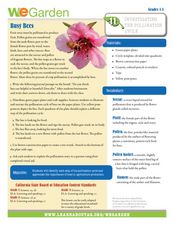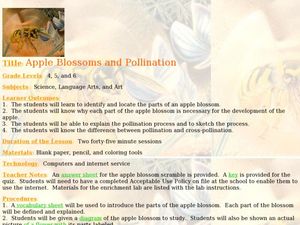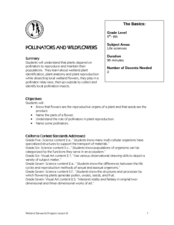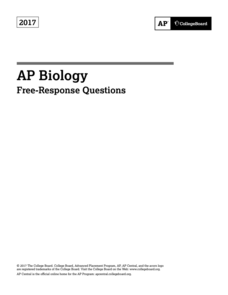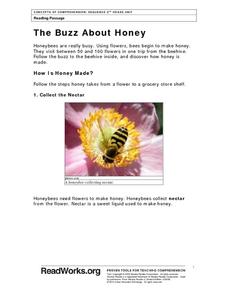Curated OER
The Disappearing Honeybees: Tracking Honeybee Decline
Students practice graphing and other math skills to track number of honeybee colonies present in United States since 1978, discuss major crops that are dependent on insect pollinators, and examine reasons for decline of United States...
Curated OER
Busy Bees
Students explore the pollination cycle. In this pollination lesson, students investigate the process of pollination. Students illustrate the pollination cycle of bees on paper plates.
Curated OER
POLLINATION DEMONSTRATION
Third graders study the terms pollen and pollination. They use appropriate vocabulary in describing their investigations, explorations, and observations (e.g., stem, pistil, stamen, flower). They describe, using their observations,...
Curated OER
Buzzing Bee's Wardrobe
Young scholars investigate the anatomy of honeybees. In this anatomy lesson, students research the physical characteristics of bees and discover what they do. Young scholars create a model of a honeybee showing the correct anatomy.
Curated OER
Plants And Pollination
Students describe sexual reproduction in plants, including the process of pollination, how insects assist in pollination, and how pollination differs from fertilization. They also explore the importance of honey bees to Arizona agriculture.
Museum of Science
Egg Carton Nursery
Observe nature in action. Young biologists make plant nurseries from cardboard egg cartons. Once the seeds sprout, they move the flowering plants outside and make observations of bees that pollinate the flowers.
Rain Bird Corporation
Rain Forest Teaching Curriculum
Take young naturalists on an exploration of the world's tropical rainforests with this extensive collection of lessons and activities. Whether its creating leaf and flower prints or investigating the absorption spectrum of...
Curated OER
Apple Blossoms and Pollination
Learners explore the concept of pollination. In this pollination lesson, students examine the parts of an apple blossom and then compare and contrast pollination and cross-pollination.
Curated OER
Pollination Parties!
Students conduct research on a specified plant and how it is pollinated. In this pollination lesson, students discover how bees pollinate plants and make life better for humans. After completing research, individuals compile a...
Curated OER
Fantastic Flower
Here is a clever activity on pollination of flowers for you. In it, learners study the anatomy of a flower, and play a game in which they simulate the process of pollination. This fine plan brings in elements of art, physical education,...
Rainforest Alliance
Stop and Smell the Flowers
It's a bird! It's a bee! Actually, it's your learners flying from flower to flower smelling their scents! Using paper flowers and essential oils, pupils flutter between flowers to use their sense of smell to experience how animals use...
EnLiST
Trap Your Own Insects: What’s in Your Backyard?
Young entomologists construct three types of insect traps—pitfall, pollinator, and panel—before setting their traps out and observing what they caught. They then observe what types of insects the different traps attract.
Curated OER
Pollination
Students investigate pollination. In this plant biology activity, students study a diagram of the reproductive parts of the flower and dissect and identify the parts of a real flower.
Curated OER
Pollinators and Wildflowers
Students explore how plants depend on pollinators to reproduce. In this pollination lesson students dissect a local flower and collect and identify pollinating insects.
Curated OER
Pollination
In this pollination worksheet, students read and assess comprehension. In this labeling and filling in the blanks worksheet, students answer fourteen questions.
College Board
2017 AP® Biology Free-Response Questions
With AP Biology remaining the most popular AP science exam, many teachers need help preparing. The College Board offers the actual free-response questions from the 2017 test covering pollination, germination, and more. Scholars learn the...
Curated OER
Pollen & Pollination
Students identify the different ways things are pollinated and how to manage pollen. In this pollination lesson students complete an experiment on how moths pollinate flowers.
Curated OER
Too Bee Or Not To Bee
Students recognize that bees are important in the reproduction of plants and to the survival of animals. In this bee lesson, students become familiar with the parts of bees and how those adaptations help them pollinate plants....
Curated OER
The Buzz About Honey
What's the buzz these days? Learn some fun and interesting facts about honeybees with an informational reading passage, including the steps for successful pollination and honey creation.
Curated OER
Matching Flowers With Their Pollinators
Young scholars match flowers to pollinators and construct models of
flowers to demonstrate why different kinds of flowers need different kinds of
pollinators. They use their flower models and the "Scientific Method Format" included in...
Curated OER
Why Are Bees Important?
Students identify and analyze pollination and how bees play an important part in the life cycle of flowering plants. They also identify the process of plant pollination and how bees play an important part in the life cycle of flowering...
Curated OER
What Bees Eat
Young scholars study plant and animal interdependence by studying bees and pollination. In this interdependence lesson plan, students discuss flower parts and dissect it to show its reproductive parts. Young scholars then use tissue and...
Curated OER
What Bees Eat
Students consider the concept that plants and animals are dependent on one another and role-play the interaction between bees and flowers. They identify crops that are dependent on pollination by bees.
Curated OER
Just Bee-Tween Flowers!
Students examine the major plant and bee parts and the interdependency between bees and fast plants. They observe and record the stages of growth of fast plants, take photos of the plant's life cycle, and cross-pollinate plants.



